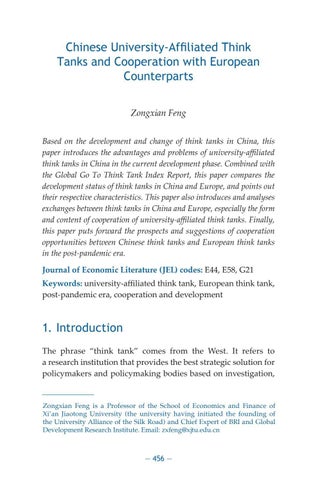Chinese University-Affiliated Think Tanks and Cooperation with European Counterparts Zongxian Feng Based on the development and change of think tanks in China, this paper introduces the advantages and problems of university-affiliated think tanks in China in the current development phase. Combined with the Global Go To Think Tank Index Report, this paper compares the development status of think tanks in China and Europe, and points out their respective characteristics. This paper also introduces and analyses exchanges between think tanks in China and Europe, especially the form and content of cooperation of university-affiliated think tanks. Finally, this paper puts forward the prospects and suggestions of cooperation opportunities between Chinese think tanks and European think tanks in the post-pandemic era. Journal of Economic Literature (JEL) codes: E44, E58, G21 Keywords: university-affiliated think tank, European think tank, post-pandemic era, cooperation and development
1. Introduction The phrase “think tank” comes from the West. It refers to a research institution that provides the best strategic solution for policymakers and policymaking bodies based on investigation,
Zongxian Feng is a Professor of the School of Economics and Finance of Xi’an Jiaotong University (the university having initiated the founding of the University Alliance of the Silk Road) and Chief Expert of BRI and Global Development Research Institute. Email: zxfeng@xjtu.edu.cn
— 456 —




